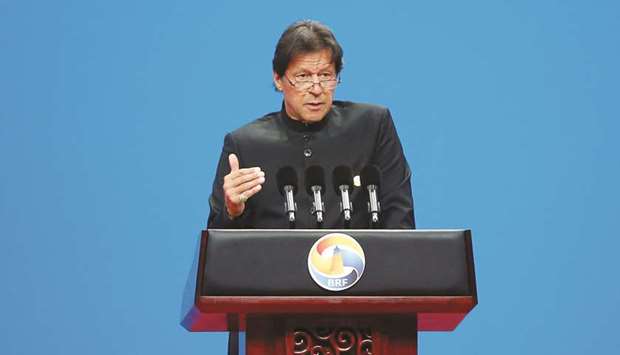Pakistan would not use nuclear weapons first, Prime Minister Imran Khan said yesterday, amid tensions with arch-rival India after New Delhi revoked the special status of its part of the disputed Kashmir region.
“We both are nuclear-armed countries. If these tensions increase, the world could be in danger,” he said, addressing members of the Sikh religious community in the eastern city of Lahore. “There will be no first from our side, ever.”
Tension remains high in Kashmir, where security forces have used tear gas against stone-throwing protesters and the valley remains under lockdown after Indian Prime Minister Narendra Modi’s decision to withdraw special rights for the Muslim-majority state on August 5.
By stripping Indian-administered Kashmir of its special status, New Delhi blocked the region’s right to frame its own laws and allowed non-residents to buy property there.
Delhi said the change would help Kashmir’s development, to the benefit of all, but its move angered many residents of the region and was strongly condemned by Pakistan.
Khan has so far focused on a global diplomatic campaign condemning India’s actions, accusing Modi of committing human rights violations and atrocities in the valley.
He has also said frequently that any misadventure between two nuclear-armed nations could endanger the world.
Muslim-majority Kashmir has long been a flashpoint between India and Pakistan.
Both countries rule parts of Kashmir while claiming it in full.
Two of the three wars they have fought have been over it.
Also yesterday, Islamabad gave a consular access to an Indian who was given a death sentence for spying by a Pakistani military court, which the International Court of Justice (ICJ) asked Pakistan to review in mid-July.
“Pursuant to the decision of the International Court of Justice, Pakistan provided consular access on 2 September, 2019 to India for Commander Kulbhushan Jadhav, Indian spy, serving Indian Naval officer,” a Pakistani Foreign Office statement said.
The statement said that at India’s request, there was no restriction on the language of communication and the access was recorded, which continued for two hours.
An Indian external affairs ministry statement said: “Jadhav appeared to be under extreme pressure to parrot a false narrative to bolster Pakistan’s untenable claims.”
India’s foreign ministry spokesman Raveesh Kumar in the statement that India would decide its next moves after receiving a detailed report from Deputy High Commissioner in Pakistan Gaurav Ahluwalia, who met with Jadhav.
“The government remains committed to continue to work towards ensuring that Shri Jadhav receives justice at the earliest and returns safely to India,” Kumar added, using a common Indian honorific.
Jadhav, a former Indian naval officer, was arrested in March 2016 in Pakistan’s restive southwestern province of Baluchistan – a region where Islamabad has long accused New Delhi of backing separatist rebels.
According to Indian officials, Jadhav retired from the navy in 2001 and was running a “logistics” business in the Iranian port of Chabahar.
New Delhi insists he was taken captive in Iran before being moved to Pakistan and then forced to confess.
Sarabjit Singh, another alleged Indian spy who was sentenced to death in 1991, was killed in his jail cell in the eastern Pakistani city of Lahore by fellow inmates in 2013.

Prime Minister Khan: There will be no first (use of nuclear weapons) from our side, ever.
